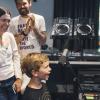“Why,” you might ask, “would I ever bring my child to the opera?” Operas are long, they are sung (for goodness sake) not spoken, the stories are often flimsy, at best, and, oh, they are usually in a language other than English.
My answer to this question is that opera is part of a constellation of arts I’d like my child to know—but the entire truth is: I am a sucker for opera and I have been taking my 12-year-old daughter to operas since she was four.
Operas are often big: big spectacle, big voices, big sets, big emotion, all of which are compelling, onstage. There are often broad moral and ethical strokes in a given opera’s story or subplot and even the silliest stories offer a stepping off point for excellent conversation.
Seattle is a great place to make opera a family activity. Every season, for some time, Seattle Opera has offered a family matinee during the run of one production. This year, it’s the March 7 matinee performance of Falstaff by Giuseppe Verdi. Tickets for children are $15 with the purchase of an adult ticket. In addition to the specially priced tickets, there are family-friendly activities before the show and during the intermissions and the KING-FM instrument “petting zoo” makes an appearance after the performance.
But wait. What about the often-flimsy story? The singing in another language?
Giuseppe Verdi—“Joe Green” in our house—is our go-to opera composer. We love Joe Green. His tunes are hummable and his operas usually have a good balance of challenge and accessibility. (The caveat: some Verdi operas, like Rigoletto and Il Trovatore, are probably too mature for younger kids.)
Verdi’s librettist, Arrigo Boito, was better than most at telling—or adapting—a good story. (A librettist writes the words that go with the music in an opera.) Falstaff is based on Shakespeare’s rotund rascal, Sir John Falstaff, who appeared in the Henry plays and who also appears in The Merry Wives of Windsor. Verdi and Boito tackled several Shakespearean works. The story of Falstaff is loosely based on The Merry Wives of Windsor, but Boito lifted some of the best of Shakespeare for the opera.
Jonathan Dean, Seattle Opera director of public programming and media, told me, “The libretto of Falstaff is one of the great masterpieces of literary adaptation, in any language. Boito translated Shakespeare into Italian, made it rhyme and scan as verse, and distilled the best material—the most famous speeches, the funniest lines, the most beloved characters—from a whole handful of Shakespeare plays into this one libretto.” So, the story has the Bard at its back and, therefore, has some heft to it. Just like Falstaff himself.
And that pesky language issue? Falstaff is sung in Italian, but Seattle Opera productions always offer supertitles, a narrow screen above the stage where a translation of the sung words appears during the action—similar to subtitles at the movies.
Dean says, “I wouldn’t necessarily recommend Falstaff (or any opera, for that matter) for kids who are too little to read; but I think those who can read titles to follow the story will find Falstaff lively, beautiful, and extremely entertaining.”
If your child isn’t yet able to read and give silent attention for three hours, consider waiting for next year’s family matinee. Seattle Opera doesn’t give age recommendations because parents know their kids best. Sara Sorden, in Seattle Opera’s PR department, says, “The show will be fast-paced, entertaining, and fun for the whole family. However, parents should keep in mind that it is three hours long.”
As with any new activity, it’s wise to prepare ahead of time. Seattle Opera’s excellent Spotlight Guide offers information about Verdi, the libretto, and Verdi’s deep affection for Shakespeare. If you want to go deeper to prepare, read The Merry Wives of Windsor or William Berger’s Verdi With a Vengeance: An Energetic Guide to the Life and Complete Works of the King of Opera. Or simply talk to your kids about what to expect at the opera: music, story, spectacle. What could be better?
Family Day activities include:
• Before the show: FREE admission to pre-performance lectures (formerly Overtures to the Opera) for an engaging and entertaining preview of Falstaff.
• First Intermission: Visit from cast members and temporary tattoos for the kids to enjoy
• Second Intermission: Curtain-up scene change (catch the action from your seats!)
• Post-performance: Instrument “petting zoo” courtesy of 98.1 Classical KING-FM, for a hands-on exploration of the world of musical instruments.
Go:
March 7, 2 p.m., McCaw Hall
$15 children’s ticket with the purchase of an adult ticket. Limit: four children’s tickets per adult ticket.
To purchase tickets go to seattleopera.org .









